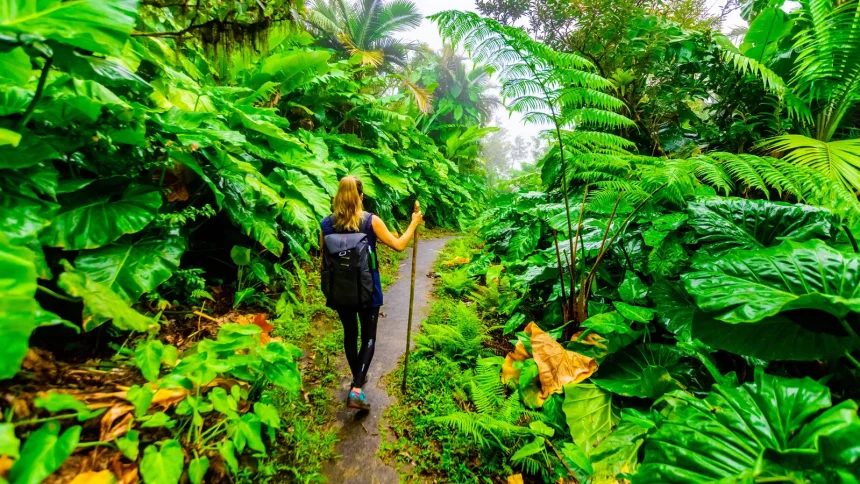1. Valencia, Spain
Each year, the European Green Capital Award is given to a city with an established and ongoing commitment to improve the environment and quality of life for residents and visitors. This year’s recipient was Valencia. Currently working towards generating 100% of its electricity from renewable sources by 2025, the Mediterranean city prides itself on its green spaces, with 500 hectares to explore, including a suite of new urban parks such as Parque Central, which unites neighbourhoods previously divided by a railway that has since been relocated below ground. This city’s green spaces also encompass the Huerta—120 sq km of produce farms that supply local markets and restaurants, thereby reducing the carbon cost of dining out and self-catering.
2. High Atlas Mountains and Marrakesh, Morocco
The earthquake that struck central Morocco in September 2023 caused the deaths of more than 2,900 people and the complete or partial destruction of 50,000 homes—most of these near the 6.8-magnitude quake’s epicentre in the High Atlas Mountains near Marrakech.
3. Saba, Dutch Caribbean
The smallest special municipality in the Netherlands, the tiny tropical island of Saba, is emerging as a champion of sustainable tourism in the Caribbean. Balancing the carbon cost of flying to the 13-sq-km island (reached by ferry from neighbouring St Maarten) is an impressive array of initiatives, including a solar park producing 35–40% of the island’s power needs, a comprehensive recycling system, a marine park encircling the island (with excellent diving), and a ban on single-use plastics (Saba has its own water bottling plant). Helping to reduce dependence on the island’s precious resources is a hydroponics farm at Rendezvous restaurant in the town of Windwardside, which uses 80% less water than conventional farming methods.
4. Singapore
Singapore’s sustainability journey is legendary, kicking off in 1967 when then-Prime Minister Lee Kuan Yew mooted his “city in a garden” vision. Following more than 50 years of mindful urban development, including the creation of more than 300km of green corridors as part of the city-state’s Park Connector Network, Singapore became the world’s first entire nation to receive sustainable destination certification from the Global Sustainable Tourism Council in 2023. The certification reflects the Southeast Asian nation’s commitment to its Singapore Green Plan 2030 goals for sustainable development, which include quadrupling solar energy deployment by 2025, reducing the waste sent to landfills by 20% by 2030, and limiting the registration of new cars to cleaner-energy models by 2030.
5. Belfast, UK
The UK’s tourism industry remains the strongest supporter of the Glasgow Declaration on Climate Action in Tourism launched at COP25 in 2021, with 172 signatories compared to the US in second place with 73. Among the UK cities making the biggest strides towards a sustainable future is Belfast, which in 2023 jumped from 47th place in the Global Destination Sustainability Index into the top 11 within 18 months. The Northern Ireland capital is now being held up as a blueprint for excellence in a white paper published by Edinburgh-based sustainability certification organisation Green Tourism.
6. Southern Great Barrier Reef, Australia
Approximately 90% of the two million annual visitors to the Great Barrier Reef stick to the sultry northern hubs of Cairns and Townsville. Yet, some of the most rewarding and low-impact opportunities to experience this 2,300-km-long ecosystem occur in the Southern Great Barrier Reef.
7. Panama, Central America
Costa Rica has carved out a reputation as Central America’s leader in sustainable tourism, and now neighbouring Panama, which in 2023 granted legal rights to turtles, is stepping into the limelight as a community-based tourism pioneer. Despite Panama’s diverse array of Indigenous cultures (accounting for approximately 14% of the population) and rich biodiversity, the nation’s tourism has traditionally centred on its famed canal and sultry capital, Panama City.
8. Maui, United States
The horror of the wildfires that ravaged the Hawaiian island of Maui in August 2023, claiming at least 115 lives, destroying more than 2,200 buildings and homes, and uprooting thousands, was felt around the world. In the days following the tragedy, many Hawaiians told tourists to stay away. But with restaurants, hotels, and tour operators forced to lay off workers and unemployment rates surging, officials are now asking people to return responsibly.
9. Greenland
Long overshadowed by the ground-breaking sustainable tourism initiatives of the lower Nordic nations, Greenland is increasingly taking steps to safeguard its icy territory and its growing tourism industry as it navigates its future on the frontlines of the climate crisis. Nuuk became the world’s first capital city to be certified by EarthCheck as a sustainable tourist destination in 2020. In 2022, Visit Greenland announced the cessation of its support for conventional cruise tourism on sustainability grounds, and in 2023, Visit Greenland invited the tourism industry to support a shared pledge towards more sustainable and responsible tourism development.
10. Dominica, Lesser Antillies
In the wake of the category-five hurricane that devastated the small Caribbean island nation in 2017,
Dominica’s prime minister announced plans to make Dominica “the world’s first climate-resilient nation.”. While the development of early-warning systems and resilient housing is now helping to safeguard residents, a new kayaking trail is helping to promote the island—already home to the Caribbean’s longest hiking trail—as a sustainable tourism destination.






